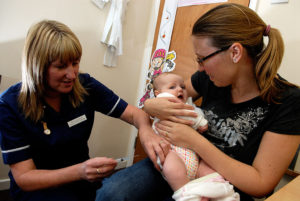Mercifully, most of us today will never witness the horrors of diseases such as polio, smallpox, and leprosy. These communicable diseases now pose far less risk due to the vaccinations that are available today. Indeed, smallpox is now considered to be eradicated globally.
However, reducing the risks associated with communicable diseases did not occur overnight; instead this happened as a result of extensive vaccination programmes, education and collaboration in the fight against wanton diseases. But sadly, even now, there are those who may still be at significant risk if they fail to receive vaccinations as children, due in part to the campaigns of ‘anti-vaxxers’, inadequate education and fear of the perceived side effects. A report published by the Royal Society of Public Health explores the often negative impact that social media has on whether children are vaccinated.
 The world has benefitted from this giant leap for humankind, as public health experts and healthcare professionals continue to strive for a world free of communicable diseases, by securing herd immunity through the sharing of public information and targeted vaccination programmes, helping to dispel misconceptions, promote the benefits and ultimately allay fears and anxieties.
The world has benefitted from this giant leap for humankind, as public health experts and healthcare professionals continue to strive for a world free of communicable diseases, by securing herd immunity through the sharing of public information and targeted vaccination programmes, helping to dispel misconceptions, promote the benefits and ultimately allay fears and anxieties.
Disappointingly, in August 2019 the World Health Organisation (WHO) declared that the UK had lost its measles-free status. The world of public health was sent into turmoil, sparking a gamut of calls for action including by the UK Prime Minister, Boris Johnson, who declared war on the anti-vaxx movement. But is this really the right approach to take?
In light of the WHO declaration, the call for mandatory vaccination has once more reared its controversial head. A sure sign that this will not go away is the knowledge that the Secretary of State for Health and Social Care, Matt Hancock, is seriously considering compulsory vaccination. Debates and opinions abound as the case for compulsory vaccination continues. But mandatory vaccinations are not the solution, being perceived as undemocratic and there is a lack of firm evidence for success where this has been implemented. So what are the options?
It may appear that by considering mandatory vaccinations, the UK government is using a sledgehammer to crack a nut, but is this true? It feels timely to have a useful and informative contemporary debate on the reasons why parents should vaccinate their children and the reasons why they do not.
Fears are often nurtured by perceived misconceptions, presumed ineffectiveness of vaccines and many parents and guardians of children are often not fully aware of the evidence base that surrounds vaccination. Many may simply be lulled into a false sense of security in the belief that many childhood diseases have been eradicated, when they have not. The impact of Andrew WakefieldMMR vaccinationontinues to be influential in the decision to vaccinate, as does social media, as parents and guardians try to make sense of the often-conflicting views they receive.
The call by the WHO Director General Dr Tedros Adhanom Ghebreyesus for social media to do more to encourage parents to vaccinate their children is likely to gain momentum as public health becomes of increasing concern to public health experts.
As the debate rages on, children who are not vaccinated against measles and other communicable diseases continue to be at risk of harm, and also to be a potential risk to others. These diseases must not be accepted as part of normal childhood exposure to illness, when it is preventable. Reliance on herd immunity is important in reducing the risks associated with diseases such as measles, which requires that 95% of the population is vaccinated, although the actual figure for herd immunity can be dependent on the type of disease.
According to new estimates by the WHO there were 10 million cases of measles worldwide last year and 142,000 deaths. As nurses, we should be aware of this public health tragedy, as well as the debates that surround vaccination and have answers to the questions asked by parents and guardians.
The Royal College of Nursing has produced an excellent educational resource that you may find of value when seeking to develop your knowledge in this important aspect of public health. Ultimately your understanding of the importance of immunisation may just make all the difference.